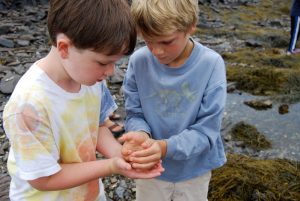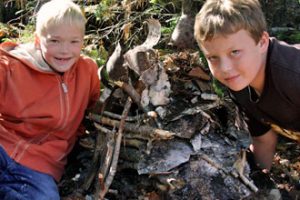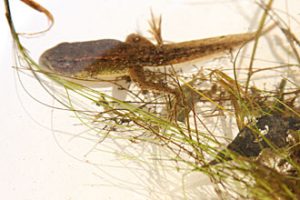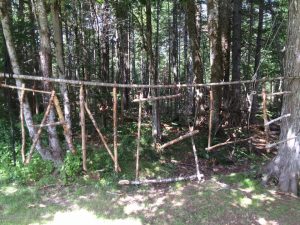
Spring and Fall Programs
The seasons of change provide a magical background to learning. From exploring how life is adapted to the freshwater environment of rivers and ponds, to learning about leadership and communication skills, our spring & fall programs are truly engaging.
Our instructors combine discovery and exploration with games and activities to really make ecology come to life in the minds of students. Skits, songs and puppetry are woven into programs, creating a vibrant and memorable learning experience.
Most of the programs offered at Tanglewood can be adapted to day or residential visits, or at your own site, providing there is local access to a suitable outdoor setting.
Intertidal Discovery

Our marine site in Northport includes both sandy and rocky beaches, mud flats, rocky coast and, at low tide, amazing tide pools! Marine dates are limited due to tide times, so early registration is recommended.
Village

An innovative program that encourages students to work together and, as a community, create a miniature village in the forest.
Intertwining hands-on learning and their imaginations, students follow the story of the Peeps: miniature people who are trying to survive through the harsh winter months. Students take on the role of the “middle-people” who help the Peeps by discovering ways to adapt for the changing seasons. Study groups become clans within the community, each specializing on a topic and then sharing what they have learned
The animal trackers clan investigate animal habitats; the food gatherers plants; the water bearers the water cycle; the storytellers stories and songs; the artists art, and the shelter builders traditional skills. The number of clans depends on class size.
Village is a 4-part program, with two visits in the fall, one in the winter, and culminates with a final closing ceremony in the spring.
Freshwater & Watershed Exploration

Getting up-close and personal with the Ducktrap river and our pond, students discover the interdependent lifestyles of the creatures that live and grow in fresh water.
Of course, the story of freshwater is not limited to rivers and ponds. Through discovery-oriented activities students gain an understanding of the necessary role clean water plays in the lives of the trees, plants, and animals in and along the river. In the springtime, these connections can be extremely evident during the shad run, as birds of prey follow the migrating shoals.
Our pond allows students to become familiar with backswimmers, frogs, and other animals and aquatic plants in the fragile riverine ecosystem. We are also extremely fortunate that the Ducktrap river, which runs through Tanglewood, is one of only a handful of rivers to sustain a native population of Atlantic Salmon. This allows us to investigate the salmon habitat, and lead onto investigating migrations.
Forest Ecology

An expedition deep into a mixed evergreen and deciduous forest, students have an opportunity to discover the interconnected world of plants, animals, and the soil — and have an adventure they are sure to remember.
The forest is always changing, as the elements and the diverse array of plants and animals that form the forest ecosystem interact with one another. Exploring the forest is truly an adventure as students discover producers, consumers, and decomposers and gain an understanding of the role each has in maintaining a healthy forest ecosystem. As we make discoveries, we also find hands-on uses for scientific methods as we identify, classify and group what is found.
Youth Forestry Camp
Students will learn how to use tools of the trade, collecting and analyzing data to determine how they can balance the needs of people with the needs of forests. Based on this investigation, they work to create management plans in small groups before presenting them to their peers through a highly educational “town meeting” format discussion.
Building Community
Develop self-esteem, leadership and creative problem-solving skills through a series of fun, interactive group challenges, including a low ropes course.
This program is a great way to establish a positive classroom dynamic at the beginning of the school year, creating trust, and fostering healthy communication.
